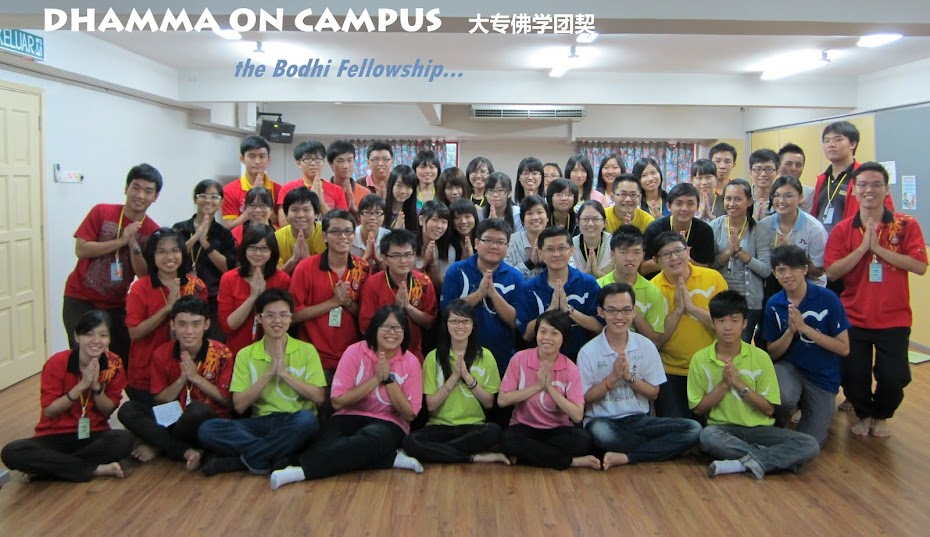-Albert Einstein
If there is any religion that would cope with modern scientific needs it would be Buddhism. -Albert Einstein
DOC that Sunday morning was indeed an inspiring one.
The morning’s event started out rather blissfully, with usual offerings done with proper understanding to remind us the Truths of life, Homage to the Buddha and puja to settle ourselves in calmness and so to connect our minds to the Buddha.
After the open ceremony by chanting versus in the Buddhist scriptures in Pali Language to recall back the core teachings of the Buddha, we warmly welcome Dharma Speaker of the day, Venerable Geshe Tenzin Zopa who is the Current Resident Teacher of LDC (2007 Jan - Present), born in 1975 in the village of Tsum located at the foothill of Himalaya. Ven. Genshe shared with us the Dharma on topic"the Foundation of Good Qualities".
According to Ven. Genshe, in Buddhism, bodhicitta(बोधिचित्त, 菩提心) is the wish to attain complete enlightenment (that is, Buddhahood) in order to be of benefit to all sentient beings trapped in cyclic existence (samsāra) who have not yet reached Buddhahood. One who has bodhicitta as the primary motivation for all of his or her activities is called a bodhisattva. Bodhicitta also means the aim to, on the one hand, bring happiness to all sentient beings, and on the other, to relieve them of suffering; this definition is consistent with the definition of seeking enlightenment, as enlightenment is the freedom from samsara.
- Relative bodhicitta, which refers to a state of mind in which the practitioner works for the good of all beings as if it were his own.
- Absolute, or ultimate, bodhicitta, which refers to the wisdom of shunyata (śunyatā, a Sanskrit term often translated as "emptiness", though the alternatives "openness" or "spaciousness" probably convey the idea better to Westerners). The concept of śunyatā in Buddhist thought does not refer to nothingness, but to freedom from attachments (particularly attachment to the idea of a static or essential self) and from fixed ideas about the world and how it should be. The classic text on śunyatā is the Prajñāpāramitā Hṛdaya Sūtra, a discourse of the Buddha commonly referred to as the "Heart Sūtra."
- the arising of spontaneous and limitless compassion for all sentient beings, and
- the falling away of the attachment to the illusion of an inherently existent self
Venerable also reminded that by having the heart of Bodhicitta alone is definitely not enough as we have to put into action to help other sentient beings with our love, compassion and wisdom. The most easiest way to practice Bodhicitta is not to harm the others and do not revenge to the people who mistreat us. In contrary, we should be reminded that all the bad things happen to us is due to the previous negative karma. Thus, we shouldn't let the Karma be recycle again as bad karma will imply for us if we did something in return to revenge. We should show our patience and remain calm for a while and try to explain in proper way to solve the problem but not make the things worse. This can be done if we practice Bodhicitta and compassion in our daily life and soon this will shape our behavior to become a patient and compassionate person.
The highlight of the evening was the Pre-Exam Prayer conducted by DOC Leader, Bro Leong Wei Hung. The prayer was done in Chinese Mahayana Tradition. together with English explanation. After lunch, every DOC member gathered at the Meditation Hall sincerely, waiting to pray to the Lord Buddha and the compassionate Bodhisattva, hoping to perform well during the SACE External Examination and End-of-semester examination in INTEC. One of the most stressful things students in INTEC face is examinations. Whether it's a regular test in class to the external exam, students are not immune to the anxiety-inducing exams. While there is probably no prayer that can get us an A on an exam if we don't prepare for, and probably no prayer that can change that "B" answer to an "A" answer. However, we can rely on prayer and the blessing of the Buddha to help us study better and relax more when taking a test. Saying a prayer at exam time can help us focus better on what we have learned so that it comes out by making smarter choices on your exams.
After the holy prayer session, DOC members expressed their greatest gratitude to the Temple, DOC Leaders and everyone in the fellowship who has contributed in shaping the DOC by singing Prayer Song entitled "Thankful". The showing of the photos from the early stage of DOC with few members till today with more than 90 members touched the heart of many members deeply. The activities continued with lively young souls communing in hymn ("Cradled in Buddha's Arm" and "the Dharma Shines in Me")
The farewell session carried out to say goodbye and expressed our thankfulness to the serving and great jobs done by our DOC Leader, Bro Leong Wei Hung, Sis Laura and all the Ausmatian seniors. Every members hugged and communing with the seniors and leaders, and this ended our DOC meeting on Sunday.
All in all, we truly enjoyed ourselves today. May the Lord give blessing and guidance for this fellowship and its following. Thank you once again to all who made today’s event the meaningful experience it was to everyone of us.=)
Sukhi Hontu


